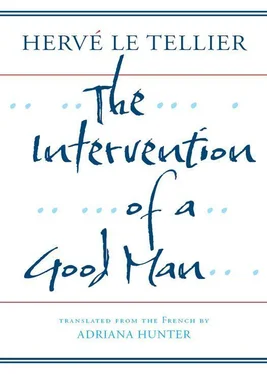Hervé Le Tellier
The Intervention of a Good Man
Everything invented is real.
GUSTAVE FLAUBERT
I get attached very easily.
ROMAIN GARY
Inverness comes from the Gaelic Ibhir Ness , meaning “mouth of the Ness.” A monster lurks in its loch, but our hero, who will arrive there tomorrow (Flight BA823), has no interest in that at all. He is coming to the heart of the Highlands to be with a woman, a very blond woman as they sometimes are in Scotland, who is twenty years younger than he is, none of which constitutes even the bare bones of a portrait.
He is coming to be with her in a place where, for the last two weeks, she has been staying with her mother and in a few days will be joined by the man with whom she spends her nights, therefore almost a husband. Of course people would call this madness, a mistake. He has made many mistakes and will make more. He is convinced — perfectly aware that he is quoting Oscar Wilde — that the only things we never regret are our mistakes.
It seems appropriate at this stage to say a little more about our hero. He will soon turn fifty. There are not fifty different ways to tackle fifty. There are two: in the first instance, you persuade yourself you are still young; in the second, you complain you are already old. Our hero ought to reject both, one out of realism, the other out of a concerted effort of will, but he settles for an obstinate pendulum swing, depending on the time of day. He is not altogether wrong in this: after all, in ten years his testosterone level will most likely start to drop and, in the absence of actual crutches for medicinal purposes, this defining question may be definitively settled. Suffice it to say that, if these are not his first old years, they are at least the last of his young ones.
Our hero has made quite an effort. He arrives tanned (there are those who would say red-faced, but some of these creams work miracles), with a bit of new muscle tone (the starting point was very low), and slightly slimmer (he was not all that fat). He hopes that these slight differences will be apparent to the young woman, but would still like to be not too different from the man he was when he managed to seduce her. He remembers the story of the woman who — because her older partner constantly strove to stay young — eventually left him for an even older man.
Our heroine, you see, seems to appreciate mature men. Her regular partner — I think we can call him that — is the same age as the irregular one, to within a month. Better two lovers of fifty than one of a hundred, the more facetious among us would quip. The reason our heroine appreciates mature men (we much prefer this expression to “old”) is not something our hero knows. He imagines it is for their wisdom, their experience, perhaps their social status — all things that do not affect him — and does not for a moment feel that wrinkles, spare tires, and creeping baldness could come under the jurisdiction of sex appeal. He thinks that whatever there is between himself and her is a misunderstanding, but feels happier saying nothing about it. Our hero is forgetting that the young, who can seduce without even thinking about it, are not always thinking of seducing. The more mature exhaust themselves with it from the moment they wake. Perhaps, with all the anxious application these two men put into appealing to her, our heroine gets what she wants.
When our hero met this heroine for the first time at a party, she was escorted by her official partner. He gave this Other (we will adopt this pleasingly nebulous term) not a moment’s thought. He found he lacked charm, but the gauging process was very swift. Our hero has not met him since but, out of curiosity, made discreet inquiries, deftly questioning mutual acquaintances. Nothing he should worry about, that was his deduction. Let us say that — if social elements matter to her — they are playing in the same league.
Mind you, the Other has stolen a march on him. Three years in a lifetime is huge, at least that is what she seems to think, because he constantly hears her saying so. The Other has become her family, while he is just a stranger. True, our hero has known her only two months, and they have seen each other, what, ten, fifteen times. How, in such a short time, he has managed to weave the web that grows tighter with every passing hour is quite another question.
No one would disagree with us on this: our heroine is pretty, very pretty. She knows it, of course. We cannot keep asking pretty women, whom men are always reminding of the fact, to behave as if they were ugly. Ours is tall, slender, with delightful little breasts, and her regular bicycling keeps her small buttocks firm; her face is dusted with freckles, her eyes are blue with flecks of gold and deep purple, and her blond hair is cut short. From a particular angle our heroine is fractionally less pretty, but the impression is terribly fleeting. As for our hero, similarly, from one specific angle he is very good-looking, but this vision is even more transient.
She is also intelligent and cultivated, although perhaps a little too ponderously so — her fondness for German authors sometimes worries him. He himself tends more toward advocates of derision: he has trouble taking seriously anyone who actually takes themselves too seriously on the third planet in a second-rate solar system. If he does not know whether she has a sense of humor, then on his own head be it: for fear of boring her, he tries to have enough for two when he is with her. He knows she can be sweet and gentle. He is afraid she could sometimes prove hard, but does not suspect her of cruelty.
Does he love her? His current state presents all the symptoms of love: painful impatience, shortness of breath, constricted chest, complete loss of appetite. For days on end he has thought of nothing but her, with a feeling of genuine dependence. An addiction which, with hindsight, justifies the term “heroine.” What does he think of when he thinks of her? Her eyes, her mouth, the back of her neck, other parts of her body that no listing could ever exhaust. This is a physical desire, one he could never fight. But what drives him toward her first and foremost is a sense of suffering, which at some points he lucidly analyzes as a fear of losing her, a fear made all the more agonizing and incomprehensible by the fact that we cannot lose what we do not possess. Does he dream about her, about what might, one day, be possible? With salutary prudence, he tries to forbid himself any plans. He does love her — we should not be afraid to use the words — and is aware that he should not.
Does she love him? No, any sensible person would reply. She is not especially considerate with him, never allows him to believe she depends on him for anything. She is quite capable of going for days on end without giving any sign of life. If we are not talking of love, but only of proof of love, the latter is sorely lacking. Unless we consider that offering her body and opening her lips for his kisses amount to indications of any such feeling for him, which is what our hero has decided to believe. He finds comfort in remembering their embraces, which are always intense. He knows from the taut feel of her young body beneath his hands that he has been synonymous with pleasure for her, every time they have met.
Let us say then that declarations, tender pronouncements, are rare. But that does not prove anything either, our hero has decided, remembering that he has received them in the past, some of them quite lovely. He prefers to believe that if our heroine occasionally seems very inflexible, it is because she feels any superfluous admission would represent a promise, and that her own honest nature means she can never leave him room for hope, because hopes dashed are a source of suffering. If our hero could read the awkward cumbersome sentence the narrator has just hatched, he would sigh, because, poor chap, he is so perfectly incapable of such strategies himself.
Читать дальше












